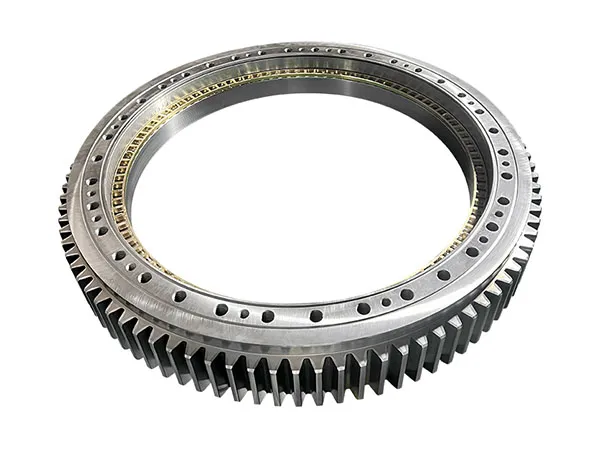A slewing bearing consists of several key components designed to handle axial, radial, and moment loads simultaneously. Here are the primary components:
1. Rings (Inner and Outer Rings)
Inner Ring:
Mounted to the stationary or rotating part of the equipment.
Includes gear teeth in geared slewing bearings for power transmission.
Outer Ring:
Supports the opposite component (stationary or rotating).
May also feature gear teeth in external-geared designs.
Function:
Provide the raceways for rolling elements and structural stability.
2. Rolling Elements
Balls or Rollers:
Balls: Used in ball slewing bearings for lower friction and moderate loads.
Rollers: Used in roller slewing bearings for higher load capacities.
Configuration:
Single-row or multi-row (e.g., double-row balls, triple-row rollers).
Crossed roller arrangements for precision and moment load handling.
3. Spacer or Cage
Purpose:
Keeps the rolling elements evenly spaced along the raceway.
Prevents direct contact between rolling elements, reducing wear and friction.
Materials:
Usually made of nylon, steel, or brass, depending on the operating conditions.

4. Seals
Function:
Protect the bearing’s internal components from contamination (dust, dirt, moisture).
Retain lubrication within the bearing.
Materials:
Made of rubber or other durable, flexible materials.
5. Gear Teeth (Optional)
External Gear:
Gear teeth located on the outer ring.
Internal Gear:
Gear teeth located on the inner ring.
Purpose:
Allow the bearing to transmit rotational motion from a drive mechanism, such as a pinion gear.
6. Raceways
Description:
Grooved tracks on the inner and outer rings where rolling elements move.
Function:
Provide the contact surfaces for rolling elements, supporting loads and facilitating smooth rotation.
…
More detailed information about the composition of slewing bearings can be found by clicking on the visit to: https://www.mcslewingbearings.com/en/a/news/slewing-bearing-components.html


